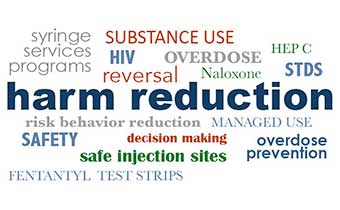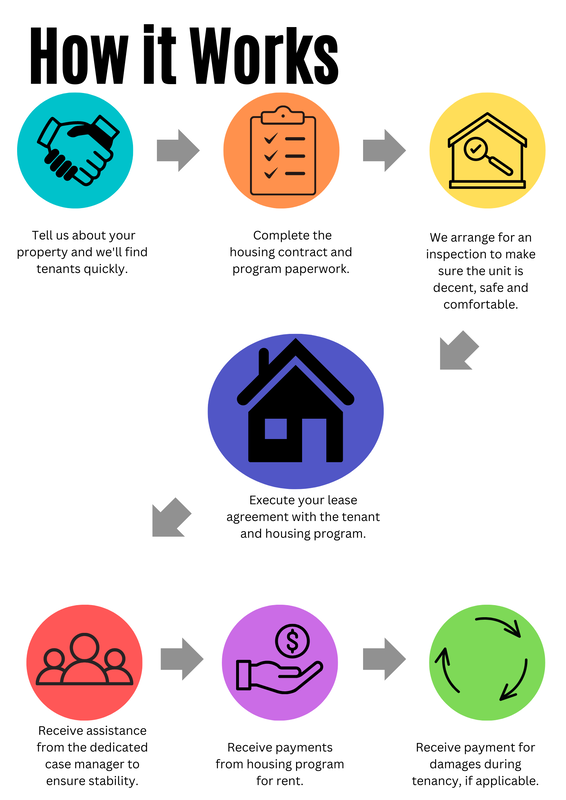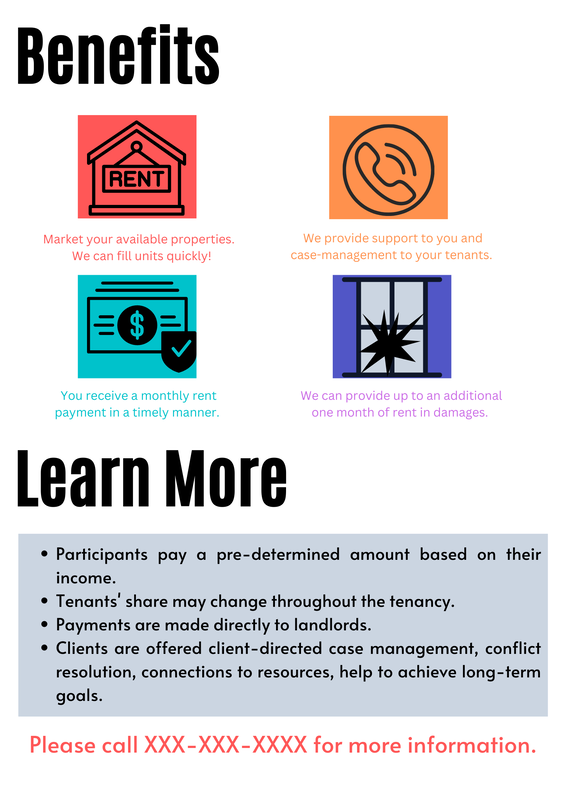Housing First
What is Housing First?
|
Wisconsin Housing First Coalition
The Housing First Coalition strives to end homelessness by advocating for and supporting effective, sound policies and practices that promote the Housing First philosophy. Website and many resources here: www.wihousingfirstcoalition.org/ |
HQS Inspections-NSPIRE Information will be here when information is available
Housing leased with CoC funds must meet the applicable housing quality standards (HQS) under 24 CFR 982.401.
Before any assistance will be provided on behalf of a program participant, the recipient, or subrecipient, must physically inspect each unit to assure that the unit meets HQS. Assistance will not be provided for units that fail to meet HQS, unless the owner corrects any deficiencies within 30 days from the date of the initial inspection and the recipient or subrecipient verifies that all deficiencies have been corrected.
Recipients or subrecipients must inspect all units at least annually during the grant period to ensure that the units continue to meet HQS
Information from the Interim Rule: www.govinfo.gov/content/pkg/CFR-2017-title24-vol3/xml/CFR-2017-title24-vol3-part578.xml#seqnum578.51
Before any assistance will be provided on behalf of a program participant, the recipient, or subrecipient, must physically inspect each unit to assure that the unit meets HQS. Assistance will not be provided for units that fail to meet HQS, unless the owner corrects any deficiencies within 30 days from the date of the initial inspection and the recipient or subrecipient verifies that all deficiencies have been corrected.
Recipients or subrecipients must inspect all units at least annually during the grant period to ensure that the units continue to meet HQS
Information from the Interim Rule: www.govinfo.gov/content/pkg/CFR-2017-title24-vol3/xml/CFR-2017-title24-vol3-part578.xml#seqnum578.51
Motivational Interviewing
What is Motivational Interviewing?
- Motivational interviewing is a client-centered approach to case management that focuses on engaging an individual’s own internal motivations to help change behaviors and work toward goals. Core principles associated with this approach include*:
- Express empathy for clients’ experiences and views;
- Support self-efficacy to help clients feel empowered to make changes, and affirm steps toward progress;
- Roll with resistance to change, and explore reasons why a client wants to change rather than trying to convince them to change; and
- Develop discrepancy to help clients understand how their current behaviors fit with their expressed goals.
Resources for learning more about a client-centered approach, including the key strategy of motivational interviewing
- Family Self-Sufficiency Program Online Training – Module 3.1 of this training describes best practices for a client-centered approach.
- Making the Transition from Case Manager to Coach – This brief describes key components of a coaching approach to working with clients.
- The Co-Active Coaching Model – The Coaches Training Institute offers trainings and a free webinar on the Co-Active Coach Training program. This coaching model is client-driven, graduated into small steps, and supportive.
- Motivational Interviewing Network of Trainers (MINT) – This professional non-profit organization of independent motivational interviewing trainers maintains a list of trainers, training events, and other resources.
- Center for Evidence-Based Practices at Case Western Reserve University: Motivational Interviewing – The Center for Evidence-Based Practices offers information and resources, including training information, on motivational interviewing.
- Spotlight on PATH Practices and Programs: Motivational Interviewing – Report from the Substance Abuse and Mental Health Services Administration (SAMHSA) detailing motivational interviewing and how to use it effectively.
- Encouraging Motivation to Change: Am I Doing This Right? – A checklist of questions from the Center for Evidence-Based Practices at Case Western Reserve University to help Service Coordinators self-assess their own adherence to motivational interviewing principles.
Additional Resources:
https://sharecollaborative.org/motivational-interviewing/
This resource offers an explanation of MI techniques and the opportunity to register for a course on MI.
Free Youtube training:
https://www.youtube.com/watch?v=fWDzebEdGto
This webinar training will review MI Spirit, the four Processes of MI and provide practice opportunities to enhance mastery of the CORE skills of Motivational Interviewing.
https://www.youtube.com/watch?v=k4ZCfUTr4FM
Motivational Interviewing (MI) is an evidence-based approach for a range of health behaviours and conditions, including addiction and mental health. MI has been described as “simple but not easy,” with hundreds of publications in the literature outlining the underlying spirit and clinical strategies. How to make sense of all this? What are the key applications that practitioners need to know?
Dr. Marilyn Herie shares her top five motivational strategies with an emphasis on practical tips and tools.
Learning Objectives: 1. Identify practical strategies to motivate change 2. Reflect on how you can adapt these strategies with your clients 3. Set concrete objectives for clinical practice
Trauma Informed Care
Trauma-informed care is a way of engaging with clients that demonstrates empathy and understanding with regard to the psychological and/or emotional effects of past or current traumas they may have experienced. It focuses on a client’s strengths to help them overcome the emotional scars that may be impeding them from meeting their personal goals.
Source: ROSS Guide: Working w/ Residents - Special Techniques to Promote Trust - HUD Exchange
Great resources for you to use:
PACEs Connection has a useful website and a newsletter that you can sign up for: https://www.pacesconnection.com/blog/organizing-your-aces-initiative-steps-to-growing-a-resilient-community
Another great website and the opportunity to earn some CEUs from The National Children's Traumatic Stress Network: https://learn.nctsn.org/
CSH: Supportive Housing Training Center offers a variety of training opportunities that include Trauma Informed Care and other trainings helpful for those that perform supportive service work in their community. CSH Supportive Housing Training Center (thinkific.com)
WI Office of Children’s Mental Health can help make your organization Trauma Informed. There are worksheets that can be accessed as well as training. https://children.wi.gov/pages/SearchResults.aspx?q=trauma%20informed%20care%20in%20your%20organization
Here is a recording of a training on Healing Centered Engagement sponsored by the WI BoS and the WI Department of Health Services. Slides are here.
Source: ROSS Guide: Working w/ Residents - Special Techniques to Promote Trust - HUD Exchange
Great resources for you to use:
- National Center on Family Homelessness: Trauma-Informed Care – The National Center develops and disseminates tools and resources for adopting trauma-informed care across service systems and provides training and technical assistance to support implementation.
- The Trauma Informed Care Project – This website explains how trauma may affect services system and/or families, and includes a calendar of trainings and events, resources listings, and a form to request training.
- National Center for Trauma-Informed Care & Alternatives to Seclusion and Restraint – Details SAMHSA's six key principles of a trauma-informed case management approach and trauma-specific interventions to address trauma’s consequences and facilitate healing.
PACEs Connection has a useful website and a newsletter that you can sign up for: https://www.pacesconnection.com/blog/organizing-your-aces-initiative-steps-to-growing-a-resilient-community
Another great website and the opportunity to earn some CEUs from The National Children's Traumatic Stress Network: https://learn.nctsn.org/
CSH: Supportive Housing Training Center offers a variety of training opportunities that include Trauma Informed Care and other trainings helpful for those that perform supportive service work in their community. CSH Supportive Housing Training Center (thinkific.com)
WI Office of Children’s Mental Health can help make your organization Trauma Informed. There are worksheets that can be accessed as well as training. https://children.wi.gov/pages/SearchResults.aspx?q=trauma%20informed%20care%20in%20your%20organization
Here is a recording of a training on Healing Centered Engagement sponsored by the WI BoS and the WI Department of Health Services. Slides are here.
Harm Reduction
What is Harm Reduction?
Harm reduction is a therapeutic engagement approach which helps individuals who are active in their substance use and not yet ready to stop or seek treatment. It helps individuals use in a way that is less harmful. For example, a street outreach worker who is developing a relationship with an injection drug user might talk with them about the types of hygiene practices they can use to reduce the risks of infection or when they use and with whom they use so that there is someone that is with them who can contact 9-1-1 if they have an overdose.
The importance of pairing recovery housing with other supportive services, providers, and healthcare is to provide an opportunity for somebody, who currently is being served through a harm reduction approach, to engage in treatment and enter recovery housing.
If somebody is in recovery housing and they continue to engage in substance use, making it no longer a suitable setting for them, discharging them to homelessness or unstable or temporary housing is not a desired alternative. By developing relationships with housing providers, who offer supportive housing using harm reduction approaches that are called Housing First, grantees can help them access housing.
Source: https://www.hudexchange.info/faqs/programs/recovery-housing-program/recovery-housing-models/harm-reduction-seemed-to-be-discussed-separately-from-recovery-housing/
Harm reduction is a therapeutic engagement approach which helps individuals who are active in their substance use and not yet ready to stop or seek treatment. It helps individuals use in a way that is less harmful. For example, a street outreach worker who is developing a relationship with an injection drug user might talk with them about the types of hygiene practices they can use to reduce the risks of infection or when they use and with whom they use so that there is someone that is with them who can contact 9-1-1 if they have an overdose.
The importance of pairing recovery housing with other supportive services, providers, and healthcare is to provide an opportunity for somebody, who currently is being served through a harm reduction approach, to engage in treatment and enter recovery housing.
If somebody is in recovery housing and they continue to engage in substance use, making it no longer a suitable setting for them, discharging them to homelessness or unstable or temporary housing is not a desired alternative. By developing relationships with housing providers, who offer supportive housing using harm reduction approaches that are called Housing First, grantees can help them access housing.
Source: https://www.hudexchange.info/faqs/programs/recovery-housing-program/recovery-housing-models/harm-reduction-seemed-to-be-discussed-separately-from-recovery-housing/
ore information in Harm Reduction: www.samhsa.gov/find-help/harm-reduction
CSH has great trainings on a variety of topics, including Harm Reduction, Trauma Informed Care, Active Engagement and may others. Many of their training you do have to pay for, but some are free.
https://cshtrainingcenter.thinkific.com/bundles/essentials-spring-2023
National Harm Reduction Coalition has really good overview of of Harm Reduction and discusses the principles, has trainings, and a library of good resources.
https://harmreduction.org/about-us/principles-of-harm-reduction/
US Department of Health and Human Services has great resources about Harm Reduction
https://www.hhs.gov/overdose-prevention/harm-reduction
SAFE Project has several resources and great articles about harm reduction.
https://www.safeproject.us/resource/the-truth-about-harm-reduction/?gclid=Cj0KCQjw2cWgBhDYARIsALggUhqbAzdglxp0iw0BPWgJb5Yzn8AZIBAN3hkITv7g4Y0zDIEiQfpLnRgaAtq6EALw_wcB
This is a great article from Harm Reduction Journal about Housing First Harm Reduction
https://harmreductionjournal.biomedcentral.com/articles/10.1186/s12954-017-0158-x
And here is the link to the home page of the Harm Reduction Journal
https://harmreductionjournal.biomedcentral.com/
The Training Institute has a Harm Reduction Training Wednesday, June 14th, 2023. Cost is $52
https://www.traininginstitute.org/w/courses/124-harm-reduction?gclid=Cj0KCQjw2cWgBhDYARIsALggUhqZNIeYYnwOsAN9mFsNvfFqGcPdmfIvKBk3mRYZ3cjCQcmcOP_DBnMaAuW6EALw_wcB
In the Works HUB offers a training on Harm Reduction and you can get bulk pricing as well.
https://intheworkshub.com/about-the-courses
Below are several TED Talks about Harm Reduction, which give a good overview of why it is so important for those we serve experiencing homelessness.
CSH has great trainings on a variety of topics, including Harm Reduction, Trauma Informed Care, Active Engagement and may others. Many of their training you do have to pay for, but some are free.
https://cshtrainingcenter.thinkific.com/bundles/essentials-spring-2023
National Harm Reduction Coalition has really good overview of of Harm Reduction and discusses the principles, has trainings, and a library of good resources.
https://harmreduction.org/about-us/principles-of-harm-reduction/
US Department of Health and Human Services has great resources about Harm Reduction
https://www.hhs.gov/overdose-prevention/harm-reduction
SAFE Project has several resources and great articles about harm reduction.
https://www.safeproject.us/resource/the-truth-about-harm-reduction/?gclid=Cj0KCQjw2cWgBhDYARIsALggUhqbAzdglxp0iw0BPWgJb5Yzn8AZIBAN3hkITv7g4Y0zDIEiQfpLnRgaAtq6EALw_wcB
This is a great article from Harm Reduction Journal about Housing First Harm Reduction
https://harmreductionjournal.biomedcentral.com/articles/10.1186/s12954-017-0158-x
And here is the link to the home page of the Harm Reduction Journal
https://harmreductionjournal.biomedcentral.com/
The Training Institute has a Harm Reduction Training Wednesday, June 14th, 2023. Cost is $52
https://www.traininginstitute.org/w/courses/124-harm-reduction?gclid=Cj0KCQjw2cWgBhDYARIsALggUhqZNIeYYnwOsAN9mFsNvfFqGcPdmfIvKBk3mRYZ3cjCQcmcOP_DBnMaAuW6EALw_wcB
In the Works HUB offers a training on Harm Reduction and you can get bulk pricing as well.
https://intheworkshub.com/about-the-courses
Below are several TED Talks about Harm Reduction, which give a good overview of why it is so important for those we serve experiencing homelessness.
Termination
Termination is expected to be limited to only the most severe cases. Programs will exercise judgment and examine all extenuating circumstances when determining if violations are serious enough to warrant termination.
CRITERIA: 1. In terminating assistance to a program participant, the agency must follow the due process provisions set forth in 24CFR§578.91,
(1) providing the program participant with a written copy of the program rules and the termination process before the participant begins to receive assistance;
(2) written notice to the program participant containing a clear statement of the reason for termination;
(3) a review of the decision, in which the program participant is given the opportunity to present written or oral objections before a person other than the person (or a subordinate of that person) who made or approved the termination decision; and
(4) prompt written notice of the final decision to the program participant.
2. Termination under this section does not bar the program from providing further assistance at a later date to the same individual or family.
3. Programs are required to re-house, rather than terminate assistance to households that are evicted from their housing while participating in the Rapid Re-Housing program
Source: www.wiboscoc.org/uploads/3/7/2/4/37244219/coc_rrh_standards_v3_.pdf
CRITERIA: 1. In terminating assistance to a program participant, the agency must follow the due process provisions set forth in 24CFR§578.91,
(1) providing the program participant with a written copy of the program rules and the termination process before the participant begins to receive assistance;
(2) written notice to the program participant containing a clear statement of the reason for termination;
(3) a review of the decision, in which the program participant is given the opportunity to present written or oral objections before a person other than the person (or a subordinate of that person) who made or approved the termination decision; and
(4) prompt written notice of the final decision to the program participant.
2. Termination under this section does not bar the program from providing further assistance at a later date to the same individual or family.
3. Programs are required to re-house, rather than terminate assistance to households that are evicted from their housing while participating in the Rapid Re-Housing program
Source: www.wiboscoc.org/uploads/3/7/2/4/37244219/coc_rrh_standards_v3_.pdf
Housing Search and Placement
Why is providing housing search assistance important?
One of the primary challenges homeless people face is navigating the housing market. Most communities have a shortage of housing affordable to low-income households. As a result, landlords can afford to use strict screening criteria, and there is little incentive to work with individuals and families that have low incomes, credit problems, criminal histories, and/or unstable housing histories. However, housing search and placement services can address many of the barriers faced by homeless people.
Source: www.hudexchange.info/resources/housingsearchtool/
One of the primary challenges homeless people face is navigating the housing market. Most communities have a shortage of housing affordable to low-income households. As a result, landlords can afford to use strict screening criteria, and there is little incentive to work with individuals and families that have low incomes, credit problems, criminal histories, and/or unstable housing histories. However, housing search and placement services can address many of the barriers faced by homeless people.
Source: www.hudexchange.info/resources/housingsearchtool/
Here is a link to an excellent HUD HSP Resource: www.hudexchange.info/resources/housingsearchtool/
Sample Forms
Housing Search Form
Housing Preference Worksheet for Clients
Sample Forms
Housing Search Form
Housing Preference Worksheet for Clients
Landlord engagement
exit planning
The goal of the CoC RRH project is to stabilize those that have recently been homeless and connect them to resources and supports that will assist them in maintaining housing stability. Exit planning begins as soon as enrollment occurs. What needs does the family have and what should be in place for support to assist the household to maintain their housing stability?
Sample Forms
Exit Planning Form Sample
Closure Form
Effective Exit Planning Worksheet — OrgCode Consulting
Exit Planning Form Sample
Closure Form
Effective Exit Planning Worksheet — OrgCode Consulting
case Management
|
|
Great resources to use to build on your skills to be an effective case manager. https://files.hudexchange.info/resources/documents/SHPCaseManagement.pdf https://endhomelessness.org/wp-content/uploads/2016/08/2016-national-slides-rrh-case-management-best-practices.pdf https://www.orgcode.com/blog/housing-based-case-management https://www.mcohio.org/FINAL_CaseMgmtManual_11_2_2015ja.pdf |
Sample Case Planning Document
Sample Needs Assessment- DEHCR approved for ESG RRH
Sample Needs Assessment #2
DV RRH File Checklist (Word) updated 5/2024
DV RRH File Checklist (PDF)
Sample PSH Needs Assessment
Sample Needs Assessment- DEHCR approved for ESG RRH
Sample Needs Assessment #2
DV RRH File Checklist (Word) updated 5/2024
DV RRH File Checklist (PDF)
Sample PSH Needs Assessment
Available toolkits
Match and financial reporting
One of the requirements for agencies to be reimbursed is that they submit source documentation for each financial request. This policy is to ensure that each agency is using their funding following the Interim Rule guidance by HUD.
The WI BoS has provided a Supporting Documentation Guide for agencies to use that explains the monthly submission requirements.
Supporting documentation requires a series of documents that support one another. You will need to show:
The WI BoS has provided a Supporting Documentation Guide for agencies to use that explains the monthly submission requirements.
Supporting documentation requires a series of documents that support one another. You will need to show:
- the original bill, invoice or timesheet.
- proof that the bill was paid.
- the accounting for it in the ledger (general ledger or monthly statement of revenue and expenses).
Match
What is it?
Match is an agency bringing supplementary or complementary resources to the CoC project.
What are the match requirement?
CoC requires a 25% match of the awarded grant amount.
What is Cash Match?
When the recipient or subrecipient spends actual funds on eligible CoC activities.
What is In-Kind Match?
In-kind match is the value of any real property, equipment, goods, or services contributed to a CoC Program grant that would have been an eligible CoC Program activity if the recipient or subrecipient paid for them directly with CoC Program funds. In-kind match can be donations provided directly by the recipient, subrecipient, or third party.
For additional information from HUD, click here for the CoC Virtual Binder.
What is it?
Match is an agency bringing supplementary or complementary resources to the CoC project.
What are the match requirement?
CoC requires a 25% match of the awarded grant amount.
What is Cash Match?
When the recipient or subrecipient spends actual funds on eligible CoC activities.
What is In-Kind Match?
In-kind match is the value of any real property, equipment, goods, or services contributed to a CoC Program grant that would have been an eligible CoC Program activity if the recipient or subrecipient paid for them directly with CoC Program funds. In-kind match can be donations provided directly by the recipient, subrecipient, or third party.
For additional information from HUD, click here for the CoC Virtual Binder.
VAWA Requirements
What is VAWA?
The Violence Against Women Act (VAWA) is a federal law that, in part, provides housing protections for people applying for or living in units subsidized by the federal government and who have experienced domestic violence, dating violence, sexual assault, or stalking, to help keep them safe and reduce their likelihood of experiencing homelessness.
Source: Violence Against Women Act (VAWA) | HUD.gov / U.S. Department of Housing and Urban Development (HUD)
The Violence Against Women Act (VAWA) is a federal law that, in part, provides housing protections for people applying for or living in units subsidized by the federal government and who have experienced domestic violence, dating violence, sexual assault, or stalking, to help keep them safe and reduce their likelihood of experiencing homelessness.
Source: Violence Against Women Act (VAWA) | HUD.gov / U.S. Department of Housing and Urban Development (HUD)
- Notice of Occupancy Rights under VAWA (Form HUD-5380)
- Model Emergency Transfer Plan for Victims of Domestic Violence, Dating Violence, Sexual Assault or Stalking (Form HUD-5381)
- Certification of Domestic Violence, Dating Violence, Sexual Assault or Stalking, and Alternate Documentation (Form HUD-5382)
- Emergency Transfer Request for Certain Victims of Domestic Violence, Dating Violence, Sexual Assault or Stalking (Form HUD-5383)
FAQ's
FMR and Rent Reasonableness
Onboarding VIdeo Training Links
Sample Forms
The WI BoS has reviewed forms from a variety of agencies and with permission from those agencies, has shared them here. These forms can be used for your RRH program and may be modified to include specific agency policies where identified.
The WI BOS has provided a DV RRH checklist that should be placed in each client file. Please review this document to ensure all things are included prior to issuing financial assistance.
DV RRH Checklist- updated 05/2024
The Briefing is an overall explanation of the CoC RRH program that can be used to ensure that your participants are aware of program guidelines and expectations.
CoC RRH Briefing
When there is a change to the amount of rent or utilities paid by the tenant and/or the agency, it's important to notify all parties of that change. This is a sample form that you can use to inform the landlord and tenant of those changes.
Adjustment of Rent or Utility Form
An Annual Assessment is required within 30 days of the one-year anniversary or Entry of a household into the project. We've provided a sample Annual Assessment form to capture the required information. Also remember to add the Annual Assessment information into HMIS.
Annual Assessment
Annual Assessment Sample #2
Agencies providing assistance to households with school-aged children are required to review the McKinney-Vento Children and Youth Experiencing Homelessness Rights in Education. This is to be documented and maintained within the case file. Attached is a sample form that you may use to document that you have reviewed these policies with your participants.
Children and Youth Experiencing Homelessness Rights in Education Form
Agencies are required to educate their participants on effectively managing their healthcare resources. Attached is a document that you can use to discuss their healthcare plan and strategies for using the healthcare system. Please include a signature form verifying that this was completed and maintain in the case file.
Roadmap to a Healthier You
This document was shared from 11813 Roadmap Booklet English (cms.gov)
There are several documents that may be needed to inform your participants regarding the hazards of lead paint. They are listed here:
Protect Your Family From Lead in Your Home Please remember to get a signature verifying that the participant was provided this information.
HUD Lead Disclosure Form
Lead Safe Housing Rule Exemption
When a client enters the project, it is important to conduct an assessment of any potential housing barriers or financial stability issues, employment, and housing needs or preferences. This is a sample form that you may use for such an assessment.
Housing Assessment Template
It is important to know what, if any, mainstream resources your participant is already receiving and which referrals for services they may want or need. To track the referrals that are made and to follow-up with the outcome of those referrals, this is a sample template that you can fill in that will be specific to your community.
Supportive Housing Mainstream Resources Chart









